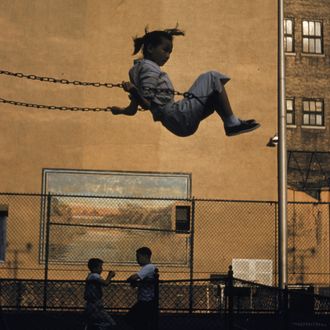
It seems like every day or so, someone complains about how kids today are over-coddled and over-protected, which is a fair point given that we are literally locking up moms (well, certain kinds of moms) for letting their kids go to playgrounds alone. A new study from the University of Montreal highlights the way in which giving kids’ playtime an express purpose — Exercise! Social development! Jungle-gym skill building! — may be counterproductive, robbing kids of the unstructured, exploratory recreation they thrive on.
While public health authorities focus on the physical activity benefits of active play, a new study from the University of Montreal reveals that for children, playing has no goal – it is an end in itself, an activity that is fun, done alone or with friends, and it represents “an opportunity to experience excitement or pleasure, but also to combat boredom, sadness, fear, or loneliness.” “By focusing on the physical activity aspect of play, authorities put aside several aspects of play that are beneficial to young people’s emotional and social health,” explains Professor Katherine Frohlich of the university’s Department of Social and Preventive Medicine[.] …
The study involved a photography and interview project with 25 Montreal area children, aged 7 to 11 years, as they photographed and talked about their favourite ways to play. One 10 year old girl loved climbing on a modern art sculpture near her home, for example. … The semi-structured interviews allowed Alexander to better understand the meaning of play for the children. “Play reframed as a way for improving physical health removes the spontaneity, fun, and freedom in children’s play, which is also important for their well-being,” Alexander said. “Active play alone does not make up many children’s preferences.” It is also clear that risk-taking is an integral part of children’s play preferences. “Allowing children to take acceptable risks while remaining vigilant is indeed beneficial to their development,” Alexander added. “An overemphasis on safety may contribute to the emergence of a generation of young people that is less and less able to cope with the unpredictable.”
It’s strange to think that all those moments playing goofy, silly games on the playground as kids help turn us into functional adults, but there’s a lot of evidence that they do. Parents, take note.

